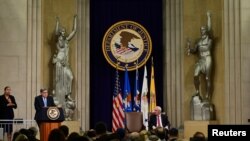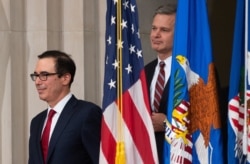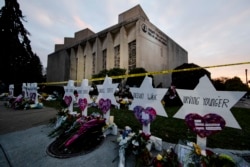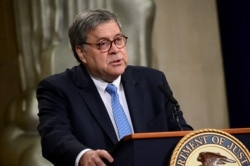Top Trump administration officials vowed Monday to fight what they termed a rising tide of anti-Semitism that at times has turned violent and caused mass murder.
Calling anti-Semitism a "cancer," Attorney General William Barr said he was deeply concerned about the rise of hate crimes and political violence, including a "marked increase" in bias attacks targeting members of the American Jewish community.
Hate crimes in the United States increased by 31% between 2014 and 2017, while anti-Semitic incidents jumped by more than 50% over the same period, according to the most recent FBI data. Anti-Semitic hate crimes accounted for most religiously motivated bias attacks.
"We must have zero tolerance for violence that is motivated by hatred for our fellow citizens, whether based on race, sex or creed," Barr said at a Justice Department summit on combating anti-Semitism. "Anti-Semitic violence is especially pernicious because it targets both Jewish ethnic identity and religious practice."
"As attorney general and a fellow citizen," Barr continued, "I want to assure the Jewish community that the Department of Justice and the entire federal government stands with you and will not tolerate these attacks."
Barr made the remarks at a daylong program that featured senior officials, including FBI Director Christopher Wray, Secretary of Education Betsy DeVos and Secretary of Treasury Steven Mnuchin, as well as Jewish community leaders and academics.
Elan S. Carr, the State Department's special envoy for monitoring and combating anti-Semitism, called the conference unprecedented, part of a broader effort to turn anti-Semitism into an "administration-wide fight."
"We're going to fight this fight together," he said.
'Global problem'
He called anti-Semitism a "global problem." While vandalism of Jewish property in the United States occurs on a "fairly regular basis" in major cities such as New York and Los Angeles, Carr said, in Europe, Jews are attacked on the streets of capitals, while in the Middle East, "textbooks inculcate children in vile anti-Semitism."
"The warning to our country could not be any more clear," Carr said. "Now is the time — not tomorrow, not next week — to safeguard our future from what is impending on our horizon."
The summit was held just months after a pair of attacks against two Jewish houses of worship provoked national outrage. In October, white supremacist Robert Bowers stormed a synagogue in Pittsburgh and gunned down 11 worshipers. Then in April, another white extremist gunman killed one person and injured three others at a Poway, California, synagogue.
Barr said that far too often, attacks on Jews don't make the front pages of newspapers. In New York City, for example, Orthodox Jews in the predominantly Jewish neighborhood of Crown Heights have reported an uptick in hate crimes over the past year, he said. In Massachusetts, vandals desecrated 59 gravestones in a Jewish cemetery in March, he added.
"People are attacking Jews in the streets and vandalizing synagogues," Barr said.
Praise, criticism
Summit speakers were critical of a student-led movement that calls for boycotts, divestment and sanctions against Israeli businesses, cultural institutions and universities. Barr said pro-Israel college students are "targeted for harassment, Jewish student organizations are marginalized, and progressive Jewish students are told they must denounce their beliefs and their heritage."
"I think of the various forms of anti-Semitism as very much like different kinds of cancer," the attorney general said.
While summit participants praised the Trump administration for its pledge to fight anti-Semitism, Trump has been repeatedly criticized by others for voicing support for groups that espouse virulent hatred of Jews. The president came under attack after he said there were "fine people on both sides" of a 2017 white nationalist rally in Charlottesville, Virginia, in 2017.
Brian Levin, director of the Center for the Study of Hate and Extremism at California State University, San Bernardino, said the president's statements "have been a source of great distress for many in the Jewish community."
"Some of the primary drivers for core segments of the president's base have also been important cornerstones or precursors to anti-Semitism," Levin said. "These include an escalation in tension over nationalism, rising religious intolerance, immigration, demographic and cultural change, as well as a distrust in communal institutions."







